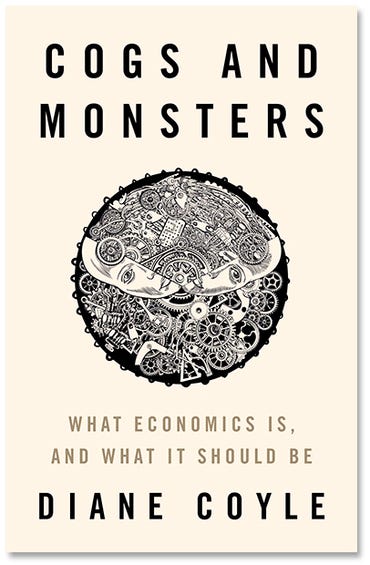[ad_1]

Cogs and Monsters: What Economics Is and What It Should Be • By Diane Coyle • Princeton University Press • 257 pages • ISBN: 978-0-691-21059-9 • $24.95 / £20
A couple of weeks ago, Jack Monroe set off a storm in the UK by detailing the three-digit inflation that applies to the basic food ranges poor people depend on. Within a fortnight, the Office of National Statistics was redesigning how it calculates inflation across the UK and Asda had restored its basic range to the shelves.
Monroe’s exercise in practical economics is a good example of one of the complaints Cambridge economist Diane Coyle makes in Cogs and Monsters: What Economics Is, and What It Should Be: the false belief that the profession is neutral and objective. As Coyle writes, the choice and design of the index that underlies how we calculate benefits payments ensures that there will be winners and losers. The choice, therefore, cannot be values-neutral.
Cogs and Monsters is a personal journey through economics, based on a series of lectures with interspersed anecdotes. Coyle, who has worked as a journalist, regulator, consultant, and academic, has watched the digital economy increase inequality since 1994, exacerbated by the 2008-2009 financial crisis. For that reason, her work is of particular interest here.
Coyle has more criticisms: economics lacks diversity to an extraordinary degree, and its decades-long focus on ‘efficiency’ is unsuited to the modern economy. It is particularly unsuited to the digital economy, which is full of externalities and network effects. What you don’t measure — quality of life, technical debt, the loss of social infrastructure as a result of austerity — remains invisible.
As a result, we still use labour statistics that don’t capture the shift to the gig economy, social change, or innovation. Some policy options are lost entirely, such as regulations to solve coordination problems where no single actor dares to embrace change until everyone does. This has particular value in the digital economy, where open standards have created huge new markets. And we remain unable to answer key questions, like how we can make society better as a whole, and how we can tell if we’ve done it — questions that are gaining urgency as AI begins to infest decision making.
Coyle concludes with a discussion of the challenges presented by the digital economy. These include the scale and leverage that today’s giant technology platforms derive from their huge collections of data, and the way the infrastructure they’ve built can help to gain control over wholly different market sectors in ways that require change to competition law. The method of assessing consumer welfare popular in recent decades relied on price, which means nothing in today’s world of pay-with-data services, as new FTC chair Lina Khan made her name observing.
The crucial open question Coyle is currently working on is how to value data. At the 2021 ODI Summit, she rejected the comparison to oil and suggested using air as an alternative analogy to understand the value everyone derives from data when it’s seen as a public good rather than a commodity. At a 2018 event, she asked this provocative question: “Does data age like fish — or like wine?” This layman would guess, “both and neither — it depends”.
RECENT AND RELATED CONTENT
What the metaverse means for you and your customers
Global research: 3 out of 4 professionals do not feel ready to work in a digital-first world
China wants in on digital economy pact, pledges global collaboration
Here are 8 steps to create a customer-unified, resilient company in a hybrid work market
Tech jobs are booming: Here’s what employers are looking for
Read more book reviews
[ad_2]
Source link

